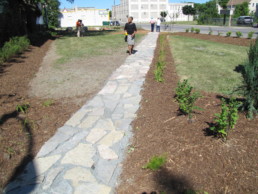Lots of Food
Year Complete: 2016
Grant Amount: $75,000
Local Government: City of Milwaukee, WI
Local Foundation: Zilber Family Foundation, Greater Milwaukee Foundation, Northwest Mutual Foundation, Local Initiatives Support Corporation, Fund for Lake Michigan
Project Purpose
To catalyze the expansion of the urban agriculture infrastructure to support local food production and distribution while developing a vacant lot reactivation strategy of scale.
Key Lessons Learned
Lessons learned about tools and tactics through the project that other sustainability directors could use to advance their work.
The project team learned that to successfully partner with neighborhoods, the sustainability office and funding partners should set aside time for planning and community engagement prior to project implementation. This project would have benefited from additional time to identify neighborhood champions, clarify roles and responsibilities, and plan for long-term maintenance and programming at the pocket-parks and orchards. City departments should utilize the existing community-based organizations to help gather community input. Budgets should be clearly defined up front so that during the design process amenities aren’t cut or postponed. Outcomes should be clearly defined and reported against throughout the project.
Lessons for developing a collaborative process between a local government sustainability director and local place-based foundation(s).
- You are only working as fast as your slowest partner.
- You can have too many partners, depending on your staffing level and timelines.
- Clearly outline roles and responsibilities of all partners at the beginning of the project.
- Strong City staff/community partner/vendor relationships going into the project will help overcome obstacles.
- Resident buy-in and ground level input is crucial to project success.
- City staff attended many neighborhood meetings and design workshops from start to end which presented a consistent face and answered questions.
- When working with non-profit groups to construct projects, negotiate and structure contracts as you would with a for-profit vendor. This helps to keep expectations clear.
- Early on, the Sustainability Director should ascertain the information needs of the foundation – e.g. weekly progress & financial reports, etc.
- Sustainability Directors should utilize the broad networks developed by foundations to access resources.
- It is helpful for only 1 or 2 foundations to be active operational partners.
- Remain flexible.
Additional Information and Resources
This project was the result of ideas put forth by the City of Milwaukee in their official sustainability plan. Read more about efforts here.

